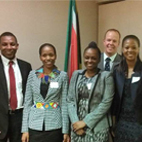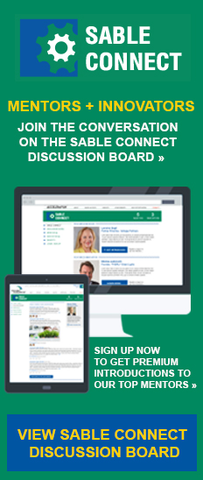Advancements & Achievements« Back to Advancements & Achievements Listings

US Exchange Program Inspires South African Innovators
By Rowan Philp, Chief International Correspondent for the Sunday Times (South Africa)
Six South African entrepreneurs were expected simply to attend an inaugural life science executive development program at the Massachusetts Institute of Technology in Boston. The goal? Soak up some tech transfer ideas.
Instead, the experience has triggered at least two serious business plans for new enterprises, including a vast center for innovation start-ups in Cape Town, and may already have identified the single key hurdle to small business growth in South Africa.
Led by Bentley University and Boston’s South Africa Partners NGO—a partner organization of The SABLE Accelerator—the Massachusetts-South Africa Technology Fellowship (M-SAT) has set up a two-way exchange between some of South Africa’s brightest innovators and biotech and IT start-ups in Boston.
The innovators included two CSIR scientists, two technology transfer professionals and two IT developers, and the “eureka” moments reported by all six represent a case study for the value of SABLE and support solutions for similar entrepreneurs.
South Africa is swimming in entrepreneurial ideas and often the skills to develop products, but it lacks that extra ingredient held in abundance among MIT start-ups: the ability to take those products to market. The five-week fellowships are designed to address this problem.
In an interview with SABLE at MIT, Veronica Motloutsi, 32, IT Strategy Manager at the Sun International hospitality group in Johannesburg, summed up the single overarching lesson, which blew away every member of the group: “You grow by focusing on one thing, not many things…by pushing one product, mastering one service.”
Immersed at Cubist Pharmaceuticals, an acute-care drug maker in Lexington, Mass., Motloutsi, 32, said, “It’s amazing; Cubist is basically pushing one product; they have become experts and, therefore, market leaders in that niche. Back home, a similar company would probably get bored—they’d be trying to push a dozen okay products, seeing which one works best. Here, they go all in on just one, and it works—and no-one is bored!”
Other “eureka” lessons included the following:
- Nodumo Zulu, a CSIR bioprocessing expert, said, “Business failure is accepted in America. In my country, people are scared to take risks by starting their businesses because of the fear of failure.” Zulu, who did her fellowship with OPK Biotech in Boston, added, “I learned that scientists (me included) need to change their mindsets toward business, and not spend too much energy and resources in the discovery stages. Biotech companies in Cambridge focus more on the business side of things.”
- Nick Allen, Director of Cape Town-based Savant Analytic, said he was struck by the impact of business contacts and shared resources among start-ups around MIT. Describing the Cambridge Innovation Center, which group-shares high-speed Internet, conference facilities and administrative resources for start-ups at all levels of development, he said, “Imagine: almost 500 start-ups working in the same innovation space! Imagine the collaborative power; the saving on overhead—this is what we need in Cape Town.”
- Echoing other fellows, Motloutsi said US companies enjoyed a vastly different approach to regulators and that there was no reason why South African innovators could not likewise engage with agencies and law-makers to become more competitive. “Companies here engage directly with government and regulators; don’t just sit back and try to do business within the limits of the rules they find in place, as we tend to do; they go to government and say, ‘If you just change such and such, we can create jobs; we can compete better with foreign companies.’”
- Mamatla Rantidi, 29, a software engineer at iLAB who interned at LogMeIn, said some IT start-ups at MIT had learned to package their customer service as a revenue-generating software product rather than as a helpline.
After their five-week immersion, the South African innovators were equally amazed to find that their home country was actually ahead of the U.S. in some areas of development.
Zulu said she was stunned to discover that, for instance, Americans still use checkbooks to pay bills—a non-secure, paper-based system which struck her as “primitive” next to South Africa’s banking system, which ranks second in the world for sophistication.
But after a single week’s immersion at cutting-edge Boston companies, all three were blown away by the same discovery: While African innovation companies try to do many things or build whole systems themselves, the best US start-ups are “experts in one thing: one perfect product.”
Carol Cashion, Education Program Director for SA Partners, said the program had not anticipated that the fellowship would directly spark new enterprises, but business plans were already being drawn up. “They have far exceeded out expectations,” she said.
Doug Sanyahumbi, Director of Technology Transfer at the University of the Western Cape, left the plane determined to help launch an MIT-like technology hub in Cape Town. After interning at Boston University’s tech transfer office, he said, “The Western Cape, with its four universities in relatively close proximity, has the potential to create a technology innovation hub that, while catering for the nuances of the South African setting, has all the prerequisite components—from excellence in research and adequate capital with appropriate investment risk appetite to experienced business mentors and globally oriented industries and start-ups.”
After consultations with managers at the Cambridge Innovation Centre, Nick Allen has already contacted an IP attorney, real estate agents and potential financiers for a similar venue in Cape Town and is drawing up a business plan. Allen, 41, is at the point of the spear of South Africa’s entrepreneurial future. He helps scientists and entrepreneurs commercialize patents and clever products that, more often than not, would otherwise vanish into obscurity.
And so, thanks partly to his business plans, local products like the Snuza baby movement monitor and the Leatt neckbrace for motorcyclists are now flying off online shelves. He’s now pushing new food processing technologies in southern Africa. At least 250 high-value African jobs have been directly created through Allen’s one-man operation, and he’s set for quick expansion.
“The biggest benefit for me stemming from the fellowship has been the connections I've built with people in the tech commercialization and incubation space in Boston,” he says. “I have learned that things aren't so different from the way we work over here—just bigger, faster and possibly a bit more sophisticated, driven by the fact that so many deals are done so quickly. Possibly the two key ingredients that are missing or less abundant than in the Boston area are early-stage finance and entrepreneurship, particularly with experienced tech entrepreneurs moving on from one successful (or unsuccessful) start-up to another.”
Cashion said the fellowship was so successful that another eight South Africans would be immersed with dedicated mentors and peers at US life sciences companies in October, and that US peers would do a return fellowship to work alongside the fellows in South Africa next month.
But Allen said the inaugural program had already planted an entrepreneurial seed, restating the central paradigm shift for all fellows. “The point in the U.S. is that you can build a business on one product—even an obscure, seemingly niche product—and go to market and become financially successful. This is driven by the scale of things in the U.S. In South Africa, people often feel they need to build a range of products to be sustainable. We need to learn (and budget) to focus on a great product and ensure we have planned for an international roll-out, particularly to a huge economy such as the U.S.”

